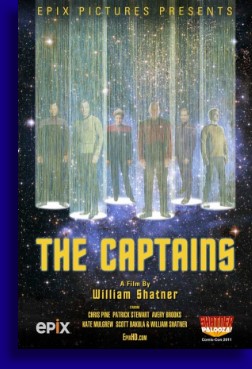

Reviewed by
Christopher Armstead

William Shatner at eighty-one, and forty plus years from the first time he first put on the uniform, has finally and completely come to grips with James T. Kirk. So Big Bill got an idea. Let’s load up the private jet, grab a Canadian film crew… being as how Mr. Shatner is Canadian and obviously hates America… and travel across the world to visit some of those Trekkie conventions and more importantly to see how the other Captains of the various U.S.S. Starships are doing, their regrets, their successes, and how they have resolved the characters that they have played. And thus we have William Shatner’s documentary ‘The Captains’ which is clearly a very personal film for Mr. Shatner and a true labor of love. Is it any good? Well, it’s very strange as far as documentaries go.
Our captains are Shatner, of course, Captain Kirk of the Enterprise in the original series, Patrick Stewart who played Jean-Luc Picard on Star Trek: The Next Generation, Avery Brooks who entered Deep Space Nine as Commander Benjamin Sisko but through exemplary service eventually received a promotion to captain, Kate Mulgrew was Captain Kathryn Janeway of the wayward ship Voyager on the TV series Star Trek: Voyager, Scott Bakula portrayed the first Starship Captain Jonathan Archer on Star Trek: Enterprise and finally there’s Chris Pine who is the new Kirk on J.J. Abrams entertaining Star Trek reboots.
Now that we are familiar with the principles, we tag along and witness William Shatner and his unique communication skills attempt to unearth the secrets behind the men and women who played the captains. Patrick Stewart, living in his out of the way English estate, alone we think, is an intensely private man who speaks of his classical acting training, his reticence at taking a role that that might occupy six years of his life, though he was assured that the show probably wouldn’t be that popular, and his regret over the failure of his marriages. Yeah… the guy played Macbeth and Richard III and whatever, but Shatner should’ve asked him was what was it like making out with Steve Railsback in the movie ‘Lifeforce’. What inspiration did he pull down for that scene? That’s what inquiring minds want to know.

Avery Brooks… well… Avery Brooks is my main man and nobody better not say anything bad about Avery Brooks while I’m around. That being said… Mr. Brooks is a different kind of cat. He answers Shatner’s questions in parables, or he will give him an answer in Jazz Piano. If you don’t speak Jazz Piano you might be out of luck in deciphering Mr. Brooks’s responses. They did sing together though. Kind of wish they hadn’t done that.
Kate Mulgrew is a lovely woman who offers a woman’s perspective of the notoriously long days filming a weekly television show, where men can get away with being detached parents, but moms… not so much... which made for weekends that were often tougher than the weekdays. Again, the question we want to know is the genesis of Capt. Janeway’s hairdo. Fierce.
Scott Bakula didn’t say this explicitly, but he did hint that his show sucked. I didn’t think so, I mean we did have T-Pol to gawk at every week. I shouldn’t have said that because now my brother’s going to corner me with his inane ‘T-Pol or 7 of 9’dilemma that I refuse to answer. Because they don’t actually exist. Actually Scott Bakula’s point was that his show didn’t develop the same level of male camaraderie Shatner’s Star Trek had. In defense of Enterprise, very few shows, outside of ‘Happy Days’, had a level of male camaraderie that the original Star Trek had. Part of this I think was because in the late sixties the majority of female characters were mini-skirt wearing sex objects as opposed to important members of the crew, unlike the future Trek shows. Lt. Uhuru… short skirted, over developed space switchboard operator. And we loved her for it.
Chris Pine and Mr. Bill arm wrestle.
‘The Captains’ is an odd film on a number of fronts, one being that it lacks the typical structure of a standard documentary where we identify the subject or dilemma, discuss the dilemma and and offer a resolution of the dilemma. Shatner kind of just throws questions out to his subjects and lets them go, or he will answer his own questions since he’s a subject as well. It’s interesting stuff because Shatner does challenge his subjects and a lot of what they had to say was fascinating, it’s just not the most organized piece of work you are going to see.
Since the film isn’t structured, I’m also not sure what Shatner is going for here. If you’re a fan of the series, the captains interviewed don’t really get into their characters or their shows all that much, but if you are a fan of the people playing the captains or if you are interested in the trials and tribulations of being an episodic actor then you are in luck because our interviewer focuses more on the people themselves and the difficulty of working eighteen hour days, six days a week. Chris Pine really doesn’t fit into the scheme of what Shatner seemed to be going for considering he’s so young, he’s from a Hollywood family and hasn’t experienced the same struggles the other actors had in trying to achieve some success, not that he had it easy, but his experiences in becoming an actor is probably a little different from Avery Brooks from Gary Indiana or Kate Mulgrew from Dubuque Iowa, and he’s been in one Star Trek movie so his experience on a movie set is completely different from the others experiences on episodic television.
If you happen to be a fan of the Star Trek series of TV shows, as I am, then this is pretty much required viewing as it does offer insights, William Shatner knows how to handle his subjects and his film is earnest and true. He’s just not a documentarian is all. And Avery Brooks really is a different kind of cat.
